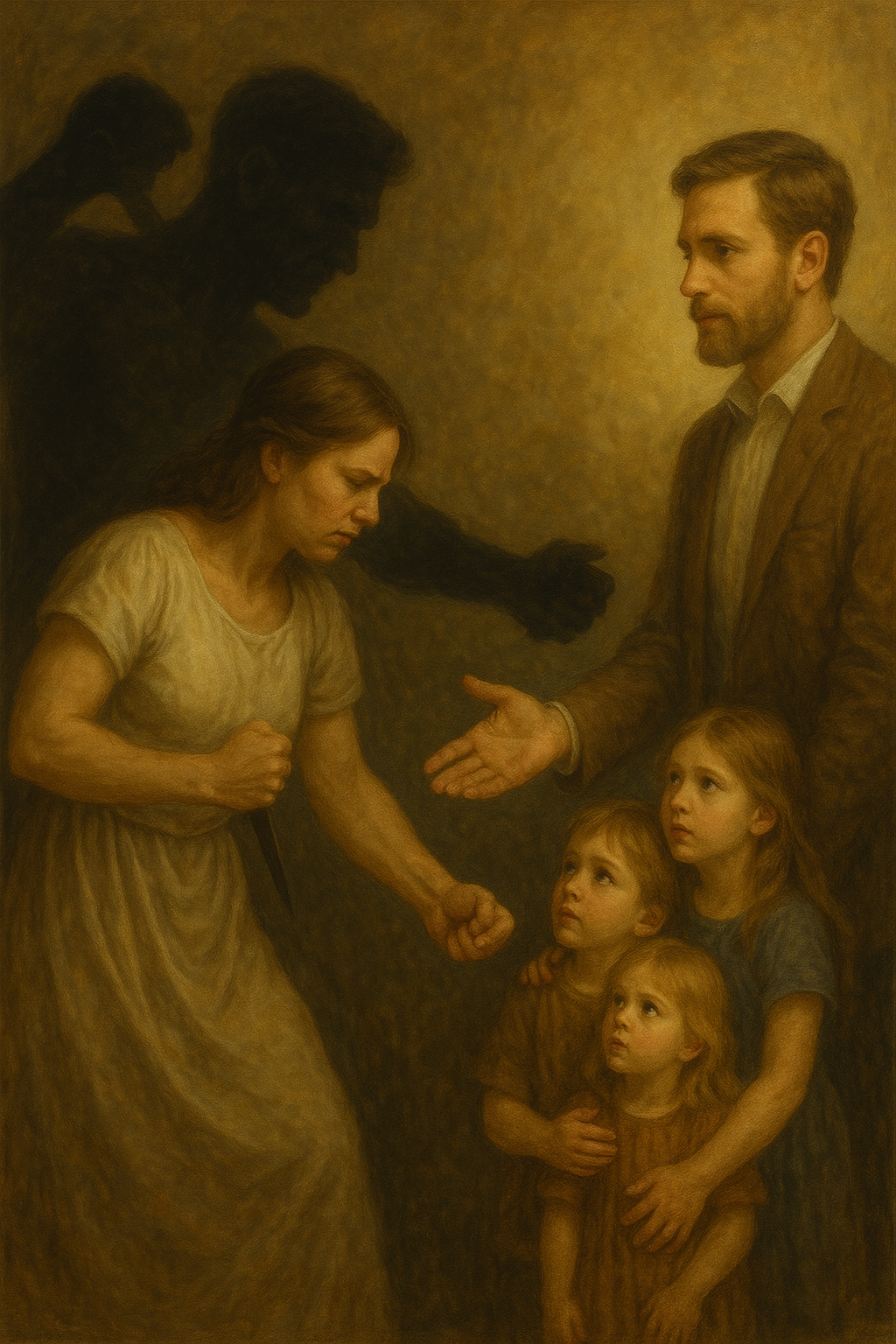The Repressed and Suppressed Femininity of the Modern Woman – On the loss of inner order between devotion and consciousness
This text is a social indictment and a psychological analysis. It seeks to understand the psychological tension of modern women by raising awareness of those inner mechanisms that C. G. Jung described as repression and suppression.
The present age has largely lost the psychological balance between masculine and feminine forces. What was once maintained through religion, morality, and symbolism must now be borne internally by the individual. Therein lies the great challenge: to recognize one's own actions not only psychologically but also ethically—as part of a higher order of life.
You will know the truth, and the truth will set you free. (John 8:32)
1. Repression and Suppression according to Jung—Basic Concepts
C. G. Jung clearly distinguishes between repression and suppression, two processes that are often confused but are psychologically quite different.
Repression is an unconscious, natural process. Consciousness rejects content that it cannot currently integrate. This content sinks into the unconscious, where it continues to have an effect and can resurface later—in dreams, symbols, or crises.
Repression is thus a protective mechanism and part of the psyche's self-regulation.
Suppression, on the other hand, is a conscious psychological conflict. It arises when a person violates morality—the objective, inner order of life—and refuses to acknowledge this violation. Conscience speaks up, but the ego rejects it.
The truth about one's own actions, thoughts, or feelings is suppressed in order to preserve one's self-image.
Thus, it is not morality itself that is suppressed, but rather the awareness of the moral contradiction. This denial creates tension, guilt, and alienation—the psychological basis of every neurosis.
But guilt consists not only in doing evil, but also in failing to do good. For good wants to be realized—it demands action. Whoever recognizes this and yet fails to do so suppresses not only their conscience but also the living will of the Spirit within them.
Therefore, whoever knows what to do and does not do it, to them it is sin. (James 4:17)
Oppression, therefore, does not arise from morality, but from the refusal to confront it.
It is not guilt that destroys, but dishonesty toward the truth—and the flight from the good that should be done.
2. The Natural Repression of Motherhood
A woman who becomes a mother experiences repression as a part of life. In her devotion to the child, she must temporarily put many things aside—personal desires, freedom, self-realization. This is healthy as long as she knows inwardly why she is doing it and this attitude remains anchored in a meaningful order.
A woman, when she gives birth, feels sadness because her time has come; But when she has given birth to the child, she no longer remembers her fear, for she is filled with joy that a human being is born into the world. (John 16:21)
Earlier cultures offered a religious and symbolic framework for this: motherhood was embedded in the divine order, in which sacrifice and fertility were two sides of the same reality. Thus, the repressed remained connected on a psychological level—it rested without being lost.
Today, this framework is missing. Motherhood is no longer a sacred duty, but a private burden. This leads women to perceive their sacrifice not as meaningful, but as unjust. Yet instead of consciously acknowledging this conflict, they suppress it—they refuse to admit that they are inwardly rebelling against the order of life, which demands bonding, care, and devotion. In this way, not only is evil fostered, but good is also neglected—and this is the deeper psychological rupture.
3. The Suppressed Wife – The Forgotten Bond Between Husband, Wife, and Child
Modern women experience not only the suppression of their femininity but also of their emotional roles—as wife and mother. Both are natural expressions of femininity, two faces of the same emotional reality. In today's society, they are not allowed to fully live either one.
What God has joined together, let no one separate. (Mark 10:9)
Marriage is not primarily a social or legal institution, but a spiritual order in which the feminine and the masculine meet, interpenetrate, and mutually purify each other. In marriage, the wife learns to deepen her devotion and anchor her love; the husband learns to control his strength and bear responsibility.
This is why marriage has been sacred in all cultures: not because it restricts the individual, but because it binds the soul—to truth, to fidelity, to responsibility.
Marriage is not primarily a social or legal institution, but a spiritual order in which the feminine and the masculine meet, permeate, and mutually purify each other. This bond is not a constraint, but a form of emotional freedom: it protects the heart from fragmentation and preserves love before disintegration into arbitrariness.
Husbands, love your wives, just as Christ loved the church and gave himself up for her. (Ephesians 5:25)
Therefore, motherhood cannot be separated from wifehood: The mother is the heart of the home, the wife its soul. Together, they form the center from which order, trust, and security arise.
The healing of women—and likewise of men—begins with the rediscovery of marriage as a spiritual space. Not as a societal obligation, but as a sacred covenant in which the feminine and the masculine mutually complete each other.
Therefore a man shall leave his father and mother and be united to his wife, and the two shall become one flesh. (Genesis 2:24)
4. Misdirected Spiritual Energy
What is suppressed does not disappear. The spiritual energy that springs from surrender and receptivity seeks new outlets: control, overachievement, activism, or emotional distance. What originally nourishes begins to deplete. Thus, not freedom arises, but coercion—the sign of a suppressed truth.
For where your treasure is, there your heart will be also. (Matthew 6:21)
5. Suppression of Femininity
Since the feminine no longer finds recognized expression in today's world, it is not only suppressed but also psychologically repressed. Women must split off their feminine nature in order to exist in masculine spaces. As a result, the maternal instinct loses its natural direction. What can no longer be lived out in the family, in caregiving, or in creative expression seeks unconscious substitutes.
Let everything that lives be fruitful and increase. (Genesis 8:17)
6. The Zeitgeist as an Amplifier
The modern Zeitgeist has no morality—it replaces it with shifting ideals: self-realization, independence, success, efficiency. These values are fluid but spiritually empty; they provide direction but no meaning.
Woe to those who call evil good and good evil, who put darkness for light and light for darkness. (Isaiah 5:20)
Today, women are often unconsciously tempted to stop doing good—not because they are evil, but because the spirit of the age presents goodness as a bondage. This creates a collective confusion in which inaction is considered a virtue. But where good is no longer done, it dies—first in the heart, then in the world.
7. Equality and Equal Rights
Equal rights mean that men and women are equal before God—as two different but equally worthy expressions of humanity. Equality, on the other hand, attempts to eliminate this difference. Thus, the feminine is measured by the standards of the masculine and loses its own center.
In the Lord, neither woman is without man, nor man without woman. (1 Corinthians 11:11)
8. The Spiritual Burden of the Modern Woman
Women stand between two poles: The religion that once provided morality has faded; the spirit of the age that has replaced it knows none. They feel guilt but don't know what for; they seek freedom but find no direction.
For what good is it for someone to gain the whole world, yet forfeit their soul? (Mark 8:36)
9. Neurosis as a Psychological Symptom
Modern women suffer from a collective neurosis and hysteria because they live in a double contradiction: They must suppress the feminine in order to survive in the masculine domain, and at the same time, they must suppress it in order to survive "morally."
For what I want to do, I do not do; but what I hate, I do. (Romans 7:15)
Neurosis is not a sign of weakness, but a cry from the soul for truth. It compels consciousness to look where it denies itself. When understood, it transforms into consciousness.
10. The Masculine Principle as a Protective Force
It is the man's responsibility to protect wife and child—not as domination, but as service to the order of life. The man must learn not to mold the woman, but to preserve her. He is the guardian of the boundary, not the possessor.
The man is the head of the woman, just as Christ is the head of the church. (Ephesians 5:23)
Thus, the man bears a twofold responsibility: He protects not only life, but also the spiritual dignity of the woman and children, so that she is not forced into the conflict of denying herself.
11. The Individual as the Path to Healing the Collective
The collective can only be changed if the individual changes. What is repressed and suppressed in the individual becomes structure, ideology, or power in society.
First take the plank out of your own eye; Then you will see clearly to remove the speck from your brother's eye. (Matthew 7:5)
This insight bridges the gap to religion: Jesus is the symbol of the individual who confronts the truth instead of projecting it. He takes guilt upon himself instead of passing it on.
He bears the burden instead of denying it; and in doing so, he transforms the collective.
If anyone would come after me, let him deny himself and take up his cross and follow me. (Mark 8:34)
The cross is not a sign of defeat, but of spiritual integration: One encounters one's own shadow, accepts it with love, and thereby becomes whole.
Only when the individual walks this path can the collective heal itself.
The kingdom of God is within you. (Luke 17:21)

